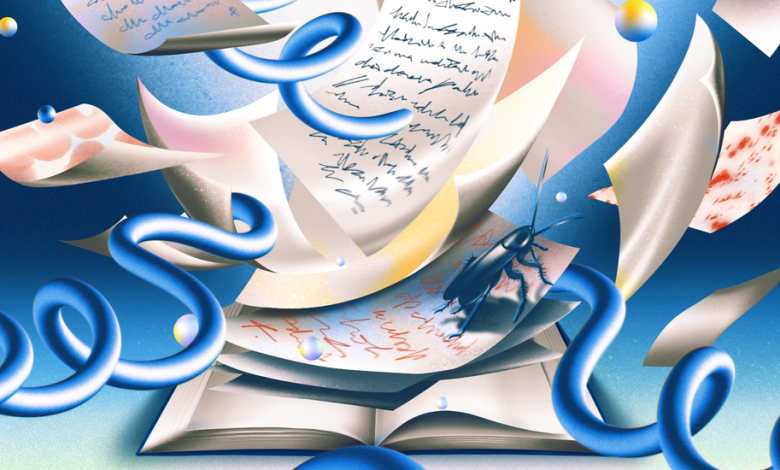A Century On, the Search for the Real Franz Kafka Continues

The first time Franz Kafka’s voice entered my head, I was 15. Two new friends I’d made through our shared interest in literature had introduced me to his fiction, and we took turns reading the Willa and Edwin Muir translations to each other in the high school library. I distinctly recall the three of us reading “The Judgment” aloud and bursting out laughing at the passage when the protagonist discovers his father’s underwear is unclean and again when his father stands up on the bed to berate him.
Later I learned that Kafka himself would erupt into laughter while reading his stories to his friends and was surprised only that this was portrayed as surprising. The nightmarish visions that made Kafka’s name synonymous with modern alienation and anxiety had come to eclipse other facets of his work, including humor.
That humor, and so much else about Kafka, is nowhere more evident than in his most intimate writing, his diaries. But for decades, English-language readers had no way to know their full richness.
As readers, we often don’t think about how translations can vary based on access to different versions of an original text. In the case of Kafka’s diaries, this was a particularly fraught matter. The only English translation available at that time, published in 1948-49, was based on a bowdlerized and substantially altered German edition that Max Brod, Kafka’s literary executor, had prepared. Brod had sanitized and sanctified Kafka, diminishing his complexity as a writer and a human.
When, after learning German, I went back and read the complete, unexpurgated diaries, faithfully transcribed from Kafka’s handwritten notebooks, I saw something different: looser, less formalized writing that seemed to me far more alive, embodied and in motion, immersed in the ongoing, exploratory process of literary self-creation.
I didn’t know it at the time, but recovering the irreducibly multivalent experience of reading Kafka would become an enormously important part of my life. That process would take eight years, and would involve stripping away much of what had for nearly a century shaped the popular perception of him. It dramatically deepened my sense of the author himself — and of translation as an act of restoration and reinvention.
A prolific writer and critic, Max Brod had been Kafka’s closest friend and a champion of his writing since their university days. After Kafka’s untimely death from complications of tuberculosis in 1924, Brod defied his testamentary instructions to burn all his papers, instead setting out on a decades-long undertaking of publishing his posthumous work. It is to Brod that we owe the survival of some of the most groundbreaking, visionary, and influential contributions to modern literature — notably, Kafka’s three unfinished novels, “The Trial,” “The Castle”and “Amerika”(as Brod titled it), and his diaries and letters.
Yet Brod also took considerable liberties in refashioning the disorderly mass of material that Kafka had left behind into structurally coherent, smoothly readable editions. His heavy-handed editorial interventions reflected an image of Kafka to which he was wedded, one etched for posterity in a biography he wrote: the pious myth of Kafka as a pure, saintly martyr to literature.
Thanks to Brod’s efforts, Kafka rose to worldwide prominence far beyond what he experienced during his lifetime. But readers, whether in German, English, or other languages, had access only to Brod’s skewed adaptations of Kafka’s literary bequest. Until Brod’s death in 1968, his versions served as the basis for all translations of Kafka, among them those my friends and I had read in the school library.
After Brod, new German editions of Kafka’s posthumous works appeared, which hewed more closely to Kafka’s manuscripts, preserving their rough edges and idiosyncrasies, flux and instability. These included the restored version of the diaries that so captivated me. A record of his abortive attempts to transfer to the page what he called “the tremendous world I have in my head,” they contain much that is fragmentary and disjointed, stumbling and stuttering. In the same notebook he would alternate among different modes of writing, jotting down observations and reflections, drafting letters and fiction, describing his dreams, now and then interspersing drawings. He crossed things out, made corrections and insertions, relentlessly reworked texts in successive variations. He wrote in fits and starts, constantly breaking off and beginning again. In the haste and spontaneity of diary writing, he penned unpolished, error-strewn prose.
This fertile disarray had hardly been visible in Brod’s edition and its English translation. Sometimes, where Kafka’s efforts to write resulted in a staccato series of false starts and new iterations that veered off in different directions, Brod rearranged the discontinuous scraps and stitched them together to fabricate a seamless composite, discarding whatever wouldn’t fit into a single, integrated whole. Gone, too, were Kafka’s misspellings, slips of the pen, sparse and unorthodox punctuation, occasionally muddled or mangled syntax, repetitions, abbreviations, contractions, regionalisms, and other stylistic quirks and infelicities.
Brod’s impulse to cover up what he saw as defects went beyond ironing out technical imperfections. In Kafka’s description of a prostitute, for example, Brod excised the line “Hair runs thickly from her navel to her private parts.” He deleted the subordinate clause of this sentence Kafka wrote during his stay at a nudist sanitarium: “2 beautiful Swedish boys with long legs, which are so formed and taut that one could really only run one’s tongue along them.” Passages he judged unflattering to Kafka, himself, or others, Brod doctored or simply cut.
Diaries stand at the threshold between life and literature, and Kafka’s were a testing ground for an idiom and sensibility he was in the midst of bringing into being. Since 1990 this Kafka, restlessly self-revising, unable to be pinned down, had been known to the German-speaking world but not to the English-speaking one. I was driven to remedy this by the urge to convey to other readers in my native tongue all that struck me as singular, important, and enthralling in the unfiltered diaries.
My translation, which I delivered to my publisher shortly after turning 40, Kafka’s age when he died, was the result of eight years spent groping and straining to make sense of Kafka’s groping and straining to make sense. Not only could I not always — or even often — be certain that I knew what Kafka meant, but I also didn’t know whether at any given moment he himself knew what he meant. Like many diarists, he didn’t always achieve a clear-cut articulation of his inchoate consciousness, to say nothing of his unconscious, but often relied on a kind of mental shorthand or associative logic hinted at only barely in the words and syntax.
I typically translate by circling back to unresolved quandaries as many times as it takes for me to feel convinced of my choices. But chasing Kafka’s almost physically elusive sense, I found myself in the same predicament that afflicts many of his characters: the more tenaciously certainty is sought, the more insistently doubt and frustration are sown. It’s a self-perpetuating, potentially interminable cycle. I came to realize that only by putting aside my demands for clarity and coherence could I do justice to what was strange, disconcerting, and even baffling in Kafka’s writing, to what unsettled any narrow interpretation or reductive theory we might otherwise be tempted to impose on it. Kafka’s irresistible appeal is preserved— indeed, in my view, it’s only enhanced — by, as far as possible, letting his writing speak for itself.
Why do I, like many others, find Kafka’s voice so invigorating, when it incessantly expresses such agony and despair? It must have to do with the inventiveness he brought to, as he put it in the diaries, “depicting my dreamlike inner life.” Far from sounding like a broken record, he is perpetually reimagining his plight, now in an animal story, now in a collection of enigmatic aphorisms, now in a charmingly self-deprecating letter. In my translation of the diaries, I sought to reveal his genius not as something fully formed, embalmed, and fit for a museum, but as that propensity for unsparing self-examination and open-ended literary experimentation which animated all his work.
Ross Benjamin is an American translator of German-language literature, including The Diaries of Franz Kafka, and a 2015 Guggenheim Fellow.
The Times is committed to publishing a diversity of letters to the editor. We’d like to hear what you think about this or any of our articles. Here are some tips. And here’s our email: [email protected].
Follow The New York Times Opinion section on Facebook, Twitter (@NYTopinion) and Instagram.




